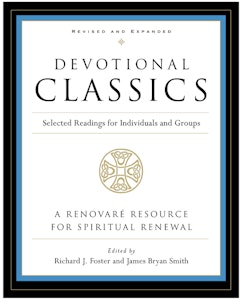Introductory Note:
I love de Caussade’s emphasis on God’s activity in the moments of our personal histories. It is this feature in his writings that saves The Sacrament from the vaporous, ethereal character of so many of the mystical works. The spirituality of de Caussade is so utterly practical and down-to-earth. He takes the moments of our days and the simple duties that make them up and gives them sacramental significance. Obedience to this duty of the present moment constitutes the path to holiness.
Nor is de Caussade speaking of a way of life beyond the reach of ordinary disciples. He writes, “Let us unceasingly impress upon every soul that the invitation of this gentle, loving Savior expects nothing difficult or extraordinary of them. Indeed, God is only asking for your heart. Everyone can aspire to the same love, the same surrender, the same God and his work.” De Caussade offers a spirituality for ordinary folk—people just like you and me.
Richard J. Foster
Renovaré Founder
 Excerpt from Devotional Classics
Excerpt from Devotional Classics
1. Sick Doctors and Healthy Patients
God’s order, his pleasure, his will, his action and grace; all these are one and the same. The purpose on earth of this divine power is perfection. It is formed, grows, and is accomplished secretly in souls without their knowledge. Theology is full of theories and arguments expounding the miracles it works in each soul. We may be able to understand all these speculations, cogently discuss, write, teach, and instruct souls through them. But with only this in mind in relation to those in whom that divine purpose exists, I suggest we are like sick doctors trying to cure patients in perfect health.
God’s order and his divine will, humbly obeyed by the faithful, accomplishes this divine purpose in them without their knowledge in the same way as medicine obediently swallowed cures invalids who neither know nor care how. Just as it is fire and not the philosophy or science of that element and its effects that heats, so it is God’s order and his will which sanctify and not curious speculations about its origin or purpose
To quench thirst, it is necessary to drink. Reading books about it only makes it worse. Thus, when we long for sanctity, speculation only drives it further from our grasp. We must humbly accept all that God’s order requires us to do and suffer. What he ordains for us each moment is what is most holy, best, and most divine for us.
2. What God Ordains for the Present Moment
All we need to know is how to recognize his will in the present moment. Grace is the will of God and his order acting in the center of our hearts when we read or are occupied in other ways; theories and studies, without regard for the refreshing virtue of God’s order, are merely dead letters, emptying the heart by filling the mind. This divine will, flowing through the soul of a simple uneducated girl, through her suffering or some exceptionally noble act in adversity, carries out in her heart God’s mysterious purpose without thought entering her head. Whereas the sophisticated man, who studies spiritual books out of mere curiosity, whose reading is not inspired by God, takes into his mind only dead letters and grows even more arid and obtuse.
God’s order and his divine will is the life of all souls who either seek or obey it. In whatever way this divine will may benefit the mind, it nourishes the soul. These blessed results are not produced by any particular circumstance but by what God ordains for the present moment. What was best a moment ago is so no longer because it is removed from the divine will which has passed on to be changed to form the duty to the next. And it is that duty, whatever it may be, that is now most sanctifying for the soul.
3. The Fruit Ripens
If the divine will ordains that reading is the duty of the present moment, reading achieves that mysterious purpose. If the divine will abandons reading for an act of contemplation, that duty will bring about a change of heart and then reading will be harmful and useless. If the divine will rejects contemplation for confessions and the like (especially if they are lengthy), it will establish Jesus Christ in our heart which all the sweetness of contemplation would only prevent.
The mysterious growth of Jesus Christ in our heart is the accomplishment of God’s purpose, the fruit of his grace and divine will. This fruit, as has been pointed out, forms, grows, and ripens in the succession of our duties to the present which are continually being replenished by God, so that obeying them is always the best we can do. We must offer no resistance and blindly abandon ourselves to his divine will in perfect trust.
This divine will is infinitely wise, powerful, and benevolent towards souls who totally and unreservedly put their trust in it, and who love and seek it alone, and who believe with an unshakable faith and confidence that what the divine will ordains each moment is best, who look no further afield for vain comparisons with any material benefits God’s order may bring.
4. Jesus Christ in the Center of Our Being
The will of God is the presence, the reality, and the virtue in all things, adjusting them to souls. Without God’s direction all is void, emptiness, vanity, words, superficiality, death. The will of God is the salvation, sanity, and life of body and soul whatever else it may bring to either of them. Whether it be vexation and trouble for the mind, or sickness and death for the body, nevertheless that divine will remains all in all. Bread without the divine will is poison, with it true sustenance. Without the divine will reading only blinds and perplexes, with it it enlightens.
The divine will is the wholeness, the good and the true in all things. Like God, the universal Being, it is manifest in everything. It is not necessary to look to the benefits received by the mind and body to judge their virtue. These are of no significance. It is the will of God that gives everything, whatever it may be, the power to form Jesus Christ in the center of our being. This will knows no limits.
5. God’s Purpose in the Present Moment
Divine action does not distinguish between creatures, whether they are useless or useful. Without it everything is nothing, with it nothing is everything. Whether contemplation, meditation, prayer, inward silence, intuition, quietude, or activity are what we wish for ourselves, the best is God’s purpose for us at the present moment. Souls must look upon everything as though it were a matter of complete indifference, and, seeing only him in all things, must take or leave them as he wishes so as to live, be nourished by, and hope in him alone and not by any power or virtue which does not come from him.
Every moment, and in respect of everything, they must say, like St. Paul, “Lord what should I do?” Let me do everything you wish. The Spirit wants one thing, the body another, but Lord, I wish only to do your divine will. Supplication, intercession, mental or vocal prayer, action or silence, faith or wisdom, particular sacraments or general grace, all these, Lord, are nothing, for your purpose is the true and only virtue in all things. It alone, and nothing else, however sublime or exalted, is the object of my devotion since the purpose of grace is the perfection of the heart, not of the mind.
6. This Secret Union
The presence of God which sanctifies our souls is the Holy Trinity which dwells in our hearts when they surrender to the divine will. God’s presence coming to us through an act of contemplation brings this secret union. Like everything else belonging to God’s order and enjoined by the divine will, it must always take first place as the most perfect means of uniting ourselves to God.
It is by being united to the will of God that we enjoy and possess him, and it is a delusion to seek this divine possession by any other means. Being united to God is the only way, not in any specific manner or style, but in a thousand different ways, and the one he chooses for us is the best. But they must all be loved and esteemed since they are all ordained by God and his purpose, chosen for and adapted to each soul to bring about the divine union. And souls must abide by his choice, preferring the way of this blessed will, and must love and respect it just as much in others.
7. We Must Set No Bounds
For example, if God’s purpose prescribes for me vocal prayers, loving sentiments, insight into the mysteries, I must love the silence and bareness which a life of faith inspires in others. But for myself, I must make use of my duty to the present and by it unite myself to God. I must not, like the quietists, reduce all religion to a denial of any specific action, despising all other means, since what makes perfection is God’s order, and the means he ordains is best for the soul. No, we must set no bounds or limits or shape to the will of God.
We must accept any way he chooses to communicate with us and respect any way it pleases him to unite himself to others. Thus, all simple souls have but one general way, though specific and different in each one, which makes up the diversity of the mystical experience. All simple souls must admire and respect one another, saying: “Let us proceed each one along our path to the same goal, united in purpose and by means of God’s order which, in its great variety, is in us all.” It is in this light that the lives of the saints and the spiritual books must be read, without ever being misled or going astray.
8. When Will God Be All in All?
It is why it is absolutely essential neither to read nor hold spiritual discourse unless ordained by God. Since his order makes it their duty to the present to do so, far from being misled, souls will find reassurance in the very things which contradict what they have learnt. But if God’s order does not make this reading and spiritual discourse the duty to the present moment, they will always emerge troubled and find themselves confused and uncertain.
Without God there can be no order anywhere. How long, then, shall we continue to concern ourselves with our own liberty or our own capacity to suffer the trials and tribulations of the present moment? When will God be all in all to us? Let us see things in their true light and rise above them to live purely in God himself.
Excerpts taken from Devotional Classics: Selected Readings for Individuals and Groups (Richard J. Foster & James Bryan Smith, Editors. HarperCollins, 1993.) and used with permission.
Photo by Aziz Acharki on Unsplash
Text First Published December 1992 · Last Featured on Renovare.org August 2021


